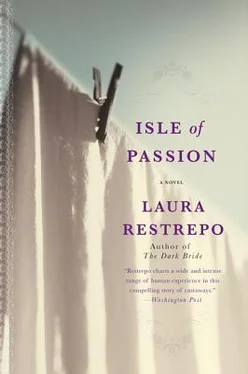“I don’t see the ship anymore.”
“But Rosalía sees it. And Ramón was sure—”
“Maybe it’s behind the fog. Maybe they can get to it, Tirsa.”
“There is nothing, and you know it. Shout with me.”
They shouted together — they all shouted, the children shouted — but the noise of the churning sea swallowed their voices.
The raft was getting close to the reefs and was being jostled about. It would ride up to the crest of a wave and then fall. The women lost sight of it, and then it appeared again, floating amid the greenish vapors or on top of another mountain of water. A big black wave pulled it back toward the beach.
“They’re coming back! They heard us, and they’re coming back!”
“Yes, they are returning.”
The women were screaming until their voices became hoarse. Speaking at the same time, they cursed, they prayed, they argued. Another wave caught the raft and threw it against the rocks.
Alicia covered her eyes with her hands.
“Tell me if they went over the reef,” she pleaded.
“I don’t see them. Yes, I do! There they are—”
“Do you see them?”
“Yes, over there.”
“Thank heaven. .. Are they all right?”
“I think so. But look… look at that dark thing that is coming out of the water.”
“A dark thing—”
“It’s a manta ray. The ray is attacking them!”
“Shut up, Rosalía. Those are rocks. Tirsa, do you see them?”
“I only see shadows.”
“Our Father who art in Heaven, hallowed be—”
“Stop praying, Alta, and take care of the children.”
The seven children had forgotten all about the raft and were mindlessly splashing about in the water.
“I am telling you it is a manta ray. It overturned the raft!”
“Open your eyes, Alicia. Help me look.”
“No, I see them. They sank! Can anybody see them?”
“There they go, there they go, I see my papa!”
“Children, hush!”
“My daddy is struggling with a manta ray.”
“Shut up! Don’t you understand? Altagracia, I’m telling you to get the children out of the water. Tirsa, do you see them?”
“No, Alicia, I don’t see them.”
“Altagracia, do you see them?”
“No, ma’am.”
“Rosalía, anybody! How come nobody sees anything?”
“Oh, Jesus, the sea swallowed them.”
“You shut up, too! Come, Tirsa, come with me.” Alicia waded deeper into the water. Ramoncito clung to her neck.
“Ramoncito, you must go back to shore.”
“No.”
“Go away, you’re going to drown, and you’re drowning me. Somebody come and get this child!”
Altagracia pulled the screaming Ramoncito away. The rest walked away also. Only Alicia and Tirsa remained, getting deeper into the water until they couldn’t touch bottom. So they floated for a while, swallowing water each time the waves went over their heads.
“Tirsa, do you see them?”
“No, I haven’t seen them for a while. I see shark fins.”
“Sharks? The sharks got them!”
“Wait. Let’s go to the beach to look for them, maybe they came back on the other side.”
They got out of the water. The children were running, all wet, their teeth chattering with cold.
“Alta, you stay with the children. Take off their clothes and put them out to dry. Everybody, help us search for Ramón and Cardona. Rosalía and Francisca, you go that way. Tirsa and I will go this way.”
They spent the rest of the morning walking over the ground coral all around the shore. Sometimes one of them seemed to see something, and they both would go into the water, calling their men in loud voices, and then they would come out of the water and continue walking. By midafternoon their feet were bleeding, cut by the broken coral. Occasionally they met the other women.
“Did you see them?”
“Nothing.”
“Keep looking. Keep looking until you find them.”
They met Altagracia and the kids. Ramoncito ran after his mother and clung to her legs.
“Not now, child.”
Ramoncito cried. He did not want to let go.
“Alta, take this child away. Give them something to eat. They must be hungry.”
“What do I give them?”
“Whatever you can find.”
“There is no fish.”
“Give them eggs. Give them water, they are thirsty. Get them dressed, they are cold.”
“Their clothes are all wet.”
“Then light a bonfire. Let me go, Ramón. Help Alta make a bonfire.”
“And Daddy? I know where Daddy is.”
“Where?”
“At home. He got there already.”
“How do you know?”
“I know.”
Alicia ran home. The child ran after her, and Altagracia after the child. When they arrived, they found the house empty.
“Didn’t you, ma’am, have something to look at things from far away?”
“Ramón gave it to the Dutchmen.”
“If they could reach Acapulco, maybe the master can also.”
“On a few tied-up boards? Don’t be silly. Take this child with you, Alta. Play with him, put him to sleep, feed him, do anything, but take him away from me. I must find Ramón.”
Alicia and Tirsa ran toward the southern rock. Seeing them go away, Ramoncito screamed, and with so much crying and hiccups, he could barely breathe. The other children, meanwhile, were playing blindman’s buff. The two women climbed up to the lighthouse and searched in all directions until their eyes hurt. The fog had grown thicker, and it was like a veil occasionally parted by the sharp fins of the sharks. Nightfall found them still there, battered by the wind’s frozen eddies, and they were still there at dawn, eyes fixed on the horizon. The sun was coming up strong, dissipating the phantasmagoric mists, and the sea woke up in shades of yellow, rose, and orange, without even a shadow to darken the limpid sunshine.
The following days were like one another, and brought no changes. Alicia wrapped her wounded feet in rags to protect them from the coral, and she wandered about the beaches incessantly, in an anguished, irrational agitation. Once in a while, she would mutter in passing.
“Alta, the children are hungry. Feed them.”
“What do I feed them, ma’am?”
“Whatever you can.”
Or else it would go like this:
“Alta, it’s very late. Put the children to bed.”
“They don’t want to, ma’am.”
“Then, let them stay up a while longer.”
She didn’t go to bed at all. She would wander around the isle like a soul in purgatory, always looking at the sea. Ramoncito, whimpering and with a runny nose, would trot behind her.
“Mommy, I know where Daddy is.”
“Listen, let’s not pretend.”
On the third day, Alicia sat in a corner of the kitchen, her feet full of blisters. She could no longer move and remained there, silent, catatonic, until Rosalía came with the news that she had seen the raft buried in the sand toward the north shore. Forgetting about her feet, Alicia rushed out, with the child tagging behind her as usual. The raft was there, but not the men. Not even a trace of them.
“Tirsa, do you think they are dead?”
“Yes.”
Alicia lay down on the sand as if she had decided to stay there forever. More than a widow’s sorrow, she felt the spite of an abandoned bride. A painful kind of anger and unreasonable jealousy consumed her. It was the sorrowful rancor of a woman whose lover leaves her for another woman, or of a man betrayed by his friends. There was no letup in her anxiety, like a woman demanding of her lover to come back, or like a man expecting a well-deserved apology. To leave and abandon her had been Ramón’s betrayal. If he ever returned, she would throw that in his face. What right had he of dying in such an absurd manner, so senselessly, and leaving her so desolate? If he ever returned, she would tell him: Didn’t you think of your children before taking such risks? If he returned — of course she would pardon him. She would embrace him, adore him, she would dry his feet with her hair. If he returned — perhaps he would return, surely he would. And Alicia lifted her head again to search the horizon.
Читать дальше












